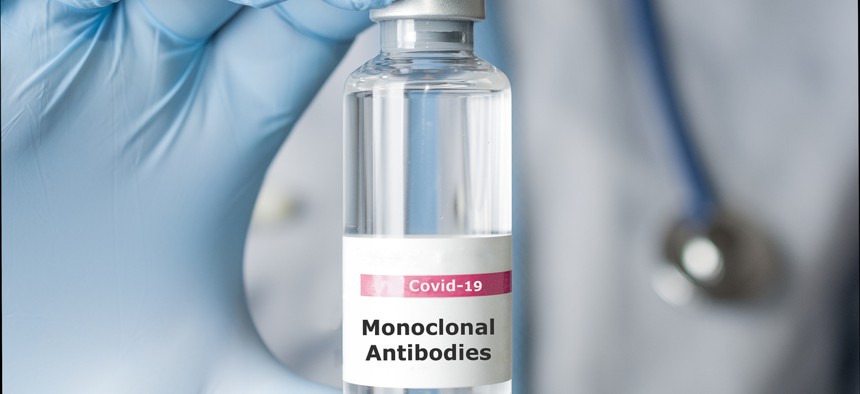Supply of Antibody Drugs Could Drop in Some States as Feds Take Over Distribution

istock.com/Cristian Storto Fotografia
The Biden administration announced the new policy after a handful of states, most of them with low vaccination rates, accounted for nearly three-fourths of orders for the Covid-19 monoclonal antibody treatment.
Some states could see reductions in the availability of an antibody treatment for Covid-19 after the Biden administration announced that it would take over distribution of the medication, a move officials said was necessary after a handful of states with low vaccination rates were vacuuming up the majority of available doses.
Health departments could previously purchase the monoclonal antibody treatment directly, in whatever quantity they deemed necessary. The new distribution process, which began last week, removes that option, granting federal health officials the authority to cap the number of doses sent each week to states and territories based on each area’s case count, hospital capacity and treatment usage. Once the doses are shipped, state-level health departments will decide which localities receive the drugs, the U.S. Department of Health and Human Services said.
“The increased incidence of the Delta variant of SARS-CoV-2 has caused a substantial surge in the utilization of monoclonal antibody drugs, particularly in areas of the country with low vaccination rates,” Health and Human Services said in a statement. “HHS is committed to helping ensure consistent availability of these critical drugs for current and future patients in all geographic areas of the country.”
“State and territorial health departments know best where product is needed in their areas,” the department added. “Transitioning to a state/territory-coordinated distribution system gives health departments maximum flexibility to get these critical drugs where they are needed most.”
At least one Republican governor criticized the change, and officials in other states warned that some people who were banking on receiving the treatment might now find it in short supply.
As of Sept. 10, states had received a total of 2.17 million monoclonal antibody doses, according to federal data. Seven states—Alabama, Florida, Georgia, Louisiana, Mississippi, Tennessee and Texas—accounted for roughly 70% of those orders. Among that group, only Texas and Florida have vaccinated at least 50% of their overall populations, according to data from the Centers for Disease Control and Prevention.
“Given this reality, we must work to ensure our supply of these life-saving therapies remains available for all states and territories, not just some," an HHS spokesman told CNN.
The treatment therapy consists of lab-created antibodies engineered to fight a specific type of infection, including Covid-19. Those antibodies act similarly to the ones created by the body’s immune system, attacking the virus to boost immune response in patients who are already sick, helping them heal while hopefully reducing the severity of their symptoms. Unlike a vaccine, the treatment does not teach the body to create its own antibodies and will not help stave off future infections, according to HHS.
The move by the Biden administration prompted health officials in some states to warn residents that they may not have access to the therapy, even if they had previously scheduled an appointment to receive it.
“We are really sorry to say that there are probably going to be some patients who aren’t going to access that drug who thought they were going to have that available,” Scott Harris, state health officer for Alabama, said at a news conference Friday. “This caught all the states in the country off-guard.”
Kentucky Gov. Andy Beshear warned residents of the possible shortage, urging vaccine-hesitant citizens to consider receiving the shot in lieu of assuming that antibody treatment would be available if they become sick.
“I have a concern that some Kentuckians who are hesitant about the vaccine are placing faith in monoclonal antibodies. What this shortage ought to tell you is that if you’re unvaccinated and you get really sick, not only might there not be a bed in the hospital for you because they are so full, but that monoclonal antibody treatment might not be there for you either,” he said in a statement. “That thing you’re counting on might not be available. What is available, and there are no supply issues at all, are these safe and effective vaccines.”
Florida Gov. Ron DeSantis, a Republican who has touted the success of monoclonal antibodies in treating Covid-19, said Friday he disapproved of the reallocation strategy. Florida’s hospital admission rate declined by more than 50% after its first monoclonal antibody infusion site opened in August, DeSantis said at a news conference. Restricting the state’s allocation of the drug, he added, would likely harm patients who are already ill and seeking treatment.
“We are very, very concerned with the Biden administration and HHS’ recent, abrupt and sudden announcement that they are going to dramatically cut the number of monoclonal antibodies that are going to be sent to the state of Florida,” he said. “There’s going to be a huge disruption and patients are going to suffer because of this.”
The announcement of the new procedure came days after President Biden said in a speech that his administration had distributed 1.4 million courses of the treatment and would increase the pace of shipment to states by 50%. At a press conference Friday, White House Press Secretary Jen Psaki said weekly shipments have since gone up, jumping from 100,000 doses in early August to 150,000 now—but that some states may see a reduction as other states begin to receive more doses of the drug.
“Our supply is not unlimited, and we believe it should be equitable across states and across the country,” she said. “I think our role as the government overseeing the entire country is to be equitable in how we distribute. We’re not going to give a greater percentage to Florida over Oklahoma.”
Kate Elizabeth Queram is a senior reporter for Route Fifty and is based in Washington, D.C.
NEXT STORY: Minnesota launches digital vaccination record





